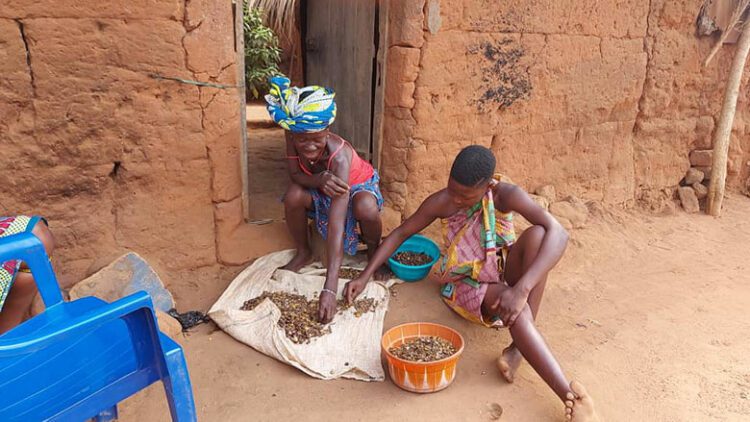Challenge
Togo has a population of 8.1 million (2019) and a gross domestic product (GDP) per capita of $679. Poverty had been declining prior to the pandemic. However, the pandemic — with 8,582 confirmed COVID-19 cases (as of March 18, 2021), including 102 deaths — and its impact on the economy has led to an increase in the poverty rate of one percentage point to 46.2 percent. Pre-COVID levels are expected to be reached only by the year 2022. About 62 percent of jobs in the country were affected, particularly in the informal sector, which employs 78.3 percent and 95.6 percent of men and women, respectively, outside of the agricultural sector. In 2020, nearly 22 percent of the population needed humanitarian assistance and 23.8 percent of children under 5 suffered from chronic malnutrition.
Approach
In response to the COVID-19 pandemic, the Bank mobilized IDA financing under the West Africa Unique Identification for Regional Integration and Inclusion (WURI) Program to support social protection delivery systems and data-driven methods for prioritizing the poorest through Togo’s Novissi emergency cash transfer program. This included support for deep-learning algorithms to prioritize the poorest 100 rural cantons based on geospatial data and population. Large phone surveys provided “ground truths” about the living conditions of 10,000 individuals. Machine-learning algorithms were trained on anonymized phone metadata to predict consumption for 5.7 million individuals (70 percent of the population), and to provide contactless social protection payments to 57,000 new beneficiaries. In 2021, several phone and in-person surveys are planned to strengthen the training of models to detect inadvertent, predictive bias against vulnerable beneficiaries, including women, the illiterate, and marginalized sub-groups. As such, it will assess exclusion and inclusion errors, as well as evaluate the impacts on food security and well-being.
Results
The first phase of the Novissi emergency social assistance program from April 7, 2020 until September 1, 2020 provided cash transfers to 572,852 informal sector workers in the greater Lomé area, the Tchaoudjo prefecture and the Soudou canton, 373,858 of whom were women. The second phase of the Novissi program with GiveDirectly, a nonprofit that lets donors send money directly to the world’s poorest, covers 57,000 beneficiaries in the poorest 100 cantons. This is achieved through a machine-learning approach that predicts consumption based on geospatial, survey and phone metadata.
Novissi has created 170,278 new mobile money accounts so far (as of January 2021), which represent a 7 percent increase in the penetration of mobile money in Togo.The 100 poorest rural cantons in Togo were identified and prioritized based on geospatial and population data.Three rounds of high-frequency mobile phone surveys covering 10,000 individuals were organized.Machine-learning algorithms trained in mobile call detail records predicted consumption patterns for 5.7 million individuals (70 percent of population).Between November 2020 and March 2021, 57,000 new beneficiaries were prioritized for contactless social protection payments through predictive algorithms.
World Bank Group Contribution
The World Bank provided IDA financing for research, development and feasibility testing of machine learning and data-driven methods to prioritize assistance for the poorest. Two rounds of phone surveys have been conducted, with another one on the way. An in-person survey is also planned shortly to enable more rigorous performance tests and training of algorithms to build predictive models. IDA also provided $72 million to finance social protection delivery systems, including foundational unique identification and integrated social information systems (SIIS), as well as equipment for the contactless social protection payments platform (Novissi) in Togo. This is part of a $400 million WURI regional IDA operation, which is a six-country program in West Africa.
Partners
The project is being implemented in a partnership between the World Bank and the Government of Togo (led by the Ministry of Digital Economy), academia (the University of California, Berkeley, Innovations for Poverty Action, and Northwestern University), as well as humanitarian and philanthropic agencies (GiveDirectly).
Moving Forward
The Novissi platform and the important lessons from the Novissi delivery systems experience will be integrated into the Safety Nets and Basic Services Project. Additional resources for this project and ongoing technical assistance to the government will support a national shock-responsive social protection program. The Novissi platform would represent a central building block of this program. It could potentially be strengthened as an integrated social information system (SIIS) in order to support the prioritization, delivery and monitoring of multiple social protection programs.
Beneficiaries
Eric Dossekpli, a 49-year-old farmer of the rural town of Anfoin Avele in Togo and father of six, struggled to sell his groundnuts, beans, maize, and cassava at the local market. The effects of the pandemic resulted in people having less money to spend on his produce. Soon, Eric could no longer afford the fertilizer he needed to keep growing the crops. He could not earn enough to cover the basic needs of his family and tuition for four of his six children.
“I didn”t know how I was going to buy food, to buy what’s needed at home,” he said.
Thanks to the GiveDirect-Novissi program’s use of new techniques for prioritizing the poor and vulnerable, supported by IDA financing, Eric was eligible for a cash transfer. Skeptical of the program at first, Eric was relieved to be covered.. It saved him from having to beg other farmers for help they could barely provide.
“I can’t imagine how I was going to live if not for this money. All I can say is thanks.”
Source link : https://www.worldbank.org/en/results/2021/04/13/prioritizing-the-poorest-and-most-vulnerable-in-west-africa-togo-s-novissi-platform-for-social-protection-uses-machine-l
Author :
Publish date : 2021-04-13 07:00:00
Copyright for syndicated content belongs to the linked Source.
